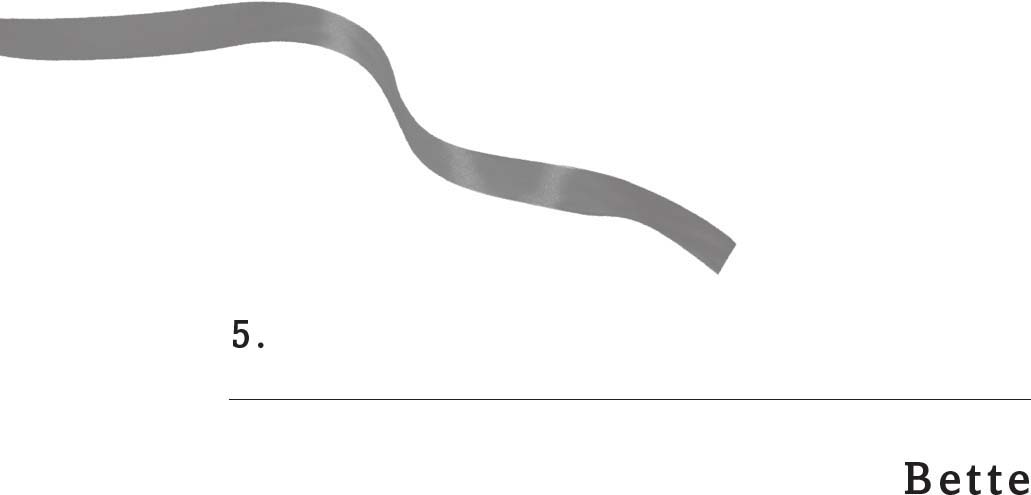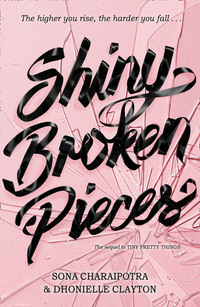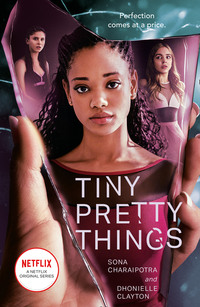
Полная версия
Tiny Pretty Things and Shiny Broken Pieces
“You’re an interesting choice for a Sugar Plum Fairy,” Alec says.
I don’t know what to say to that.
“I mean, you’ll bring a lot of energy to the role,” he says, filling the space where I am not talking. His arm grazes mine—a breath between our skin, so close I can feel the heat of it, but neither of us moves away to get more space.
“Thank you,” I say, letting myself believe, for just one second, that Alec is just as curious about me as I am about him. “Didn’t Cassandra dance it last year? Wasn’t she only a sophomore?” I don’t know why I say it, and I wish I could erase the words after seeing his face twist into a pained expression.
He nods. “Yeah, she did. Cassie’s my cousin.”
A strange silence stretches between the two of us. No one really speaks about the girl who left last year, which makes me sad and curious. And I didn’t know she was his cousin. I start to say I’m sorry.
“It’s cool. Let’s not talk about it. Let’s talk about you dancing the role.” It’s not lost on me that Alec smiles when I smile right now, or the way his eyes light up when I say in way too small a voice that I’m excited to work with him. And he doesn’t move away. I wonder if he needs to get back upstairs to his room, if he needs to get some sleep.
“I’m excited to work with you, too,” he says, the blueness of his eyes glowing even brighter.
There’s a noise at the opposite end of the hall. He moves away. “See you tomorrow, okay?” he asks.
“Yeah,” I say.
“Don’t stay up too late,” he says, and walks in the opposite direction, leaving me to think over the words and the light touch while I walk farther down the hall, farther into the dark.
The corridor dead-ends at a staircase that leads down into the basement level. I’ve noticed people never walk this far down the hall. I race down. This area is separate from the student rec lounge and the physical therapy room, like it has been purposefully blocked off. There’s a studio here that’s locked up. A small studio window gives a view inside: the shadowy outline of stored objects. The first week of school I’d asked June about the unused studio, and she’d said it’d always been under construction, and that the teachers hated it because it had no windows, and ballet needs light. The Russians call it plokhaya energiya: a room brimming with bad luck and darkness, and so it isn’t used.
But I don’t believe in superstitions. I don’t exit the dressing room with my left foot first or sew a lucky charm into my tutu or kiss the ground in the stage wings before going on for a performance or need other dancers to say merde to me on opening night. At home, my parents have their silly broom to sweep out evil and often burn sage to keep the house energy clean. But I only believe in my feet and what they can do in pointe shoes.
I pull a bobby pin out from my bun and push it into the old lock, waiting for the tiny bolt to ease downward and click out of place. I like to be in places where I’m not supposed to be—in my old high school’s attic or in the empty house in my San Fran neighborhood. There’s a tiny thrill in picking a lock and exploring a space that others want closed up.
The lock gives without much effort. I look to the left, then look to the right, and disappear into the dark space. Dirt and debris crunch under my sandals, and I run my hand along the wall, and click a switch.
The one working light sputters, and then buzzes on. The bare lightbulb flickers an erratic pulse. Its half-light illuminates covered objects, a partially gutted dance floor, and mirrors draped with black sheets. Broken and decayed barre poles lean at odd angles, coated in a constellation of cobwebs and dust. The air is thick and inviting.
I head to my little corner, plop down my dance bag, and inspect myself in the only uncovered mirror. Descending from the upper corner of the glass, a tiny fracture stretches across my reflection like a lightning bolt. Mama says looking into a broken mirror is bad luck, but I don’t care. My lip has a hilly scab. I can’t believe I bit it so badly. That my nerves made me do that. The ugly aberration replaces whatever is pretty about my face. I won’t let myself get nervous like that again.
My phone buzzes in my bag. My parents. They know I’m still up. I click them to voice mail. I know what they want. They’ll ask if the nurse checked me after the cast list excitement. They’ll gloss over my accomplishment, only wanting to know how I’m feeling physically. Since I came out here, they treat me like I’m sick, some patient who shouldn’t be out or who should be in a wheelchair, or better yet, a bubble. I was officially cleared to dance at the conservatory months ago. I try not to think about it. I don’t want anyone to know. Ever.
I turn on the music on my cell phone. The Nutcracker score sounds tinny and distant, but it will have to do. I need to dance. I dig my pointe shoes out of my messy bag and put them on. My legs start first, extending out of my hips so far I feel like I’m on stilts. Long and tall, I stretch from the top of my head down to my tiptoes, trying to become one straight line. As I dance my mind quiets and my body takes over. I follow the current of music, each chord a wave, each note a splash. My feet move to match the rhythm, drawing crazy, invisible patterns on the floor.
My heart’s racing. I tell myself it’s just from the dance and the excitement of landing the role. But a voice in my head whispers that it’s because I’m thinking of Alec, too. Bette’s Alec. My chest tightens. Control your breathing. I haven’t had one episode, not in ballet class, not in Pilates, not in character dance, not even once all last year at my old regular school. I’m fine. I will my heart to slow. I’m in control of my body.
I come down off pointe, wipe the sweat from my forehead, and put my hands on my head until I can catch my breath. If I stretch a bit, maybe I’ll relax even more. If I focus on the deep pulls in my muscles, I can get it together. I push my leg across the barre to feel the stretch and the calm that usually comes afterward. My muscles tremble, my feet spasm, my hands shake. My fingernails are purple. The light flickers off for a long moment. Sad darkness surrounds me until the light comes on again. Maybe I’m not good enough to dance the Sugar Plum Fairy. Maybe I’m not cut out for the role. Maybe I’ ll disappoint Mr. K and Alec and prove everyone right. Maybe Mama was right—I’m not well enough to dance.
“Shut up,” I say to the mirror. “Chill out.” I fight the negativity. “I got the role!”
My heart’s not slowing down. This hasn’t happened in a whole year. My body usually obeys. I sit on the floor and press the soles of my feet together so that my legs form butterfly wings. I press on my knees. I try to breathe like a yogi—deep, slow breaths. Nothing will take this away from me. Nothing.

NO ONE HAS SPOKEN TO me since the cast list went up, not even Eleanor, who is breathing heavily in the bed next to mine, so comfortable with mediocrity as an understudy that she can sleep right through her failure. I do all the tricks: counting sheep, picturing myself afloat on the ocean, pretending my body is filling with grains of sand and getting heavier and heavier.
It does nothing for me. On endless loop is one impossible thought: I am not the Sugar Plum Fairy. I am not the Sugar Plum Fairy. I assume I have text messages on my phone from Alec, checking to make sure I’m okay after I ran off and hid in my room, but nothing can interrupt the flow of those words and their hold on my mind. Which is why it takes me a few moments to register the loud knocking at our door at one o’clock in the morning, when the dorm should be all silence except for room-mate whispers or secret hookups.
“Bette?” Eleanor says, and it’s her voice, sleepy and soft, that breaks through the loop. Then the harsh knocking and our RA calling out my name, louder and louder.
“Jesus, what’s going on?” I say, and get myself out of bed and to the door. Eleanor moves more slowly, rubbing her eyes and grumbling about the time and the noise. Our sour-faced RA is at the door when I open it, and she rubs her knuckles as if the incessant knocking has caused her an injury.
She does not look pleased.
Then again, neither do I.
“Your mother,” she says.
“You can’t send her away?” I say.
Eleanor is awake enough to scoff behind me.
“So not my job,” our RA says, and she stomps off, slamming the door to her room behind her and probably waking up the students who didn’t already stir from all the knocking. A few people have opened their doors, and others are shuffling behind them. The gutsier ones take the elevator right after me and come down to the parents’ lounge on the first floor, though Eleanor tries to motion them away and Liz threatens them with bodily harm. It’s useless: my mother always puts on a show, and they know it. Besides, these girls have been waiting a decade for my downfall. They wouldn’t miss it for the world.
She’s right outside the elevator when the doors open, moments away from heading up without permission: steely, skinny, mouth in a line so straight I could use it as a ruler. My mother. She smells like red wine and rare steak and the angry kind of sweat.
“Bette,” my mother says, her lips tight and too pink from Chanel lipstick, which has been hurriedly drawn on over red wine–stained lips. The Ts in my name land hard. She pulls me past the front desk and toward studio C. The three other elevators open with a ping. More students pour out. She doesn’t seem to notice, or care. Someone laughs, but the cowards mostly hide near the elevator bank or chat up the front-desk guard, waiting to hear whatever she’s come to say to me. They are too far away to smell the booze on her breath or to see the unfortunate pit stains that have ruined her couture gown. But they’ll be able to hear every slurred word. “Next time, please tell me the truth about how your audition has gone.”
My mother doesn’t raise her voice. Not ever. It’s more powerful all low and practiced anyway, and she knows it. Even when the vowels are long and loose and the words slip on top of each other, she stays in control of the volume. We’re WASPs; we don’t shout.
“It’s not like I’m some understudy, Mother,” I say. I do not let my voice break, but my eyes are filling with tears. During the last winter ballet, I was the only Level 6 girl, besides Cassie, to dance a soloist part. I was the Harlequin Doll, cast with the Level 7 and 8 girls. I try to remember that feeling, but my mother erases every inch of it.
“I’d already called some very important people to come see you perform, Bette,” she says. “You said your audition went well. I took that to mean you were ready to be seen. When your sister—”
“You want to take it up with Mr. K?” I say. “I killed it. He smiled. He ever smile at Adele? At anyone? He was practically beaming.”
“Maybe it was because he was laughing at you. Did you ever consider that?” she says. I tell myself that she would never say this if she hadn’t been drinking, but I know that’s not true. She keeps that pink Chanel smile on her face and her eyes don’t leave mine. She’s not that drunk. There is not a pinch of sadness or regret in the words coming out of her mouth.
Eleanor and Liz slink out of the late-night shadows. Our unspoken rule is that neither of them will leave me alone with my mother if things get out of control, and I guess this qualifies. Eleanor, Liz, and I give one another a look, and both of them take a few steps closer to me.
“Hi, Mrs. Abney!” Eleanor’s voice chimes out, a welcome interruption, but too light and pretty for this time of night and this kind of conversation.
“Hey, Mrs. Abney!” Liz adds, her tone thick with exhaustion. My mother ignores them both. She’s not done tearing me to pieces, not yet.
“You don’t think. You just act,” she says. “Just like your father. That’s your problem.”
I decide not to cry at the mention of my father, but promise myself that I can feel upset about it later, alone in my room, maybe when Eleanor is in the shower or something.
“Who got it?” my mother says then. I can practically see her little ears prick up like a dog’s, hunting for the next target. She’s come straight from her charity event to find out the answer to this very important question. Her eyes settle on Eleanor, then comb over Liz—my only obvious competition.
“Doesn’t matter. Not me,” I say. I didn’t want to say Gigi’s name. I don’t want to hear the things my mother will say about her or the accusations she will make. I don’t want Gigi, if she’s listening somewhere with the rest of them, to think she matters to me. Or my mother.
“Who, Bette?” She leans in a little closer, so that instead of just seeing the Chanel on her lips I can practically taste the shit, that pitch-perfect perfume and the acidic way it mixes with her boozy breath. The combination hits my taste buds hard.
“New girl,” I mumble.
“Oh Christ,” my mother yells, breaking her vow to stay silent and calm in spite of everything. Liz steps away; even she can’t handle it. Eleanor grabs my elbow, like I might topple over from the cruelty without her help.
“Her name’s Gigi,” Eleanor breaks in. “She’s really a totally different type from Bette, so I don’t think it was even really about the dancing—” She tries hard to protect me from the unstoppable gale wind that is my mother.
“Gigi …” My mother puts it all together. The woman spent the summer reading up on the newest recruits to the conservatory. If anyone can put a face with a name, it’s her. “Gi— no.” She stops. Her eyes widen as she stares at Eleanor’s red face.
I should feel relief. The pressure is off me so fast I almost lose my balance, all that weight just sliding away. Eleanor’s grip on my elbow tightens.
“Well,” she says. “We can certainly fix that.”
I grab for her arm, knowing she’s going to head right for Mr. K. She knows he sometimes stays very late in his office. But my hand is too shaky and sweaty from the third-degree interrogation that’s just gone down. And so she escapes, her gown sweeping behind her as she makes her way to the office with the kind of singular determination only ever rivaled by my sister, Adele. If I’m lucky, he’s not there, and she’ll just leave an angry, drunken voice mail that I hope his secretary will erase in the morning. She already has her cell phone in her hand, armed with everything she needs to make a fuss and to make a joke of our family.
“It’s okay,” Eleanor whispers in my ear, which means it definitely isn’t. Eleanor only ever says that when things are really bad. Liz doesn’t say a word. Just lets her forehead frown and her mouth purse, acknowledging the complete mortification of this moment. She knows it’s bad. She doesn’t lie to me. Not even to make me feel better.
Other students punch at the elevator button, no longer trying to stay quiet. There are guttural laughs and a few imitations of the great, drunk Mrs. Abney.
I look over at one of the elevators. Will stands there holding it open for everyone, red hair gelled up with the color-enhancing treatment he puts in every night, his cell phone in his hand, no doubt sending out mass texts (and hopefully not video) about what just happened. And I know he’s the reason half the school is down here watching in the first place. He loves seeing me fall.
Eleanor tries to hold me in place, so that I don’t run after the vultures, but I practically throw her off me. Maybe I got drunk on my mother’s breath. I don’t know. But I’m getting really tired of keeping it together, especially when it doesn’t make a difference. I fly after the students, fueled with the desire to hit one of them. I almost do, too. June’s just a hand’s length in front of me, and I could push her too-skinny ass straight into the elevator doors if I wanted. And I do want to. Just to hurt someone. Just to feel a release.
Hitting her will only get me into more trouble, though, and she’s not the person I hate most of all right now.
“Watch out, ladies! Bette’s a real animal,” Will calls out with a smug grin on his face. I want to slap the look off his face, but I shove past him, past June, past all of them, making sure to elbow as many girls as possible on my way to the last elevator. I don’t let anyone get in with me. It zips up to the eleventh floor. I throw open the door to my bedroom. And then the door to my bathroom. And there she is, the girl I hate. The one I really want to punch. I draw my hand back, make my first real fist, and punch the mirror. Hard. So hard it shatters around my hand. So hard that sad pieces of glass clatter in the sink. So hard my knuckles start to bleed. It hurts, but not as much as the rest of the day.

AT 7:30 EVERY MORNING AND 8:30 every night, on the dot, my mom calls. Like clockwork. She wants to ensure that her good little girl remains exactly that, which means I have to be tucked away in my room, safe and sound, a half hour before curfew. To confirm that I’m actually in the dormitory and not just pretending to be, she doesn’t call my cell phone but rather the pay phone in the girls’ hallway—a relic from the old days. What she doesn’t realize is that I am always here—in the studios, the dorm, a classroom, or the student lounge. I do nothing but study and dance. I am her good little girl.
I watch the hall and wait to see if Gigi’s back. That nut got up at six a.m. to go to Central Park to feed the ducks. Last time she brought me a flower for my desk, which is kind of nice or whatever. She’s really into nature, but she should be stretching or seeing how Bette’s looking this morning, since she slept through all of last night’s theatrics. She’s the Sugar Plum Fairy, after all, and that means she is probably Bette’s next victim. Or everyone’s victim for that matter. We don’t handle change to our hierarchy very well. I’m still shocked by Mr. K’s decision. And I’m still on the fence about Gigi. Some days I like her, some days I don’t. It’s been so long since I’ve had a friend, I don’t know what to do, how to behave.
This morning I’m worn out from staying up late to watch Bette’s mom cut her down to size. I didn’t relish it the way the other girls did, but I like to know what I’m up against. I like to know everything about everyone because it all matters at this school—what you eat, what you wear, where you came from, how much you weigh, your ballet training, who your friends are, how much money you have, if you have good feet, if you’ve won any competitions, what kind of connections you have, if your parents have season ballet tickets, if your mother or father was a dancer, if you know the history of ballet. And I plan to know it all. About every single dancer here. That’s the only way to be on top.
I thumb the pay phone’s receiver at 7:26 a.m., my stomach griping as I wait for it to ring. I feel like I ate too much for breakfast. My mom is always exactly on time, so, knowing I have exactly four minutes, I run into the hallway bathroom. I throw up a mix of water, tea, and grapefruit. Two fingers bring it out smooth and soundless. The third grade was the first time I ever did it. I caught my mom vomiting after a dinner party at the neighbor’s house. She’d swept me from the bathroom, her face clammy and hands shaky, telling me that American food can poison you, and you must always get rid of it. I asked her why she’d eaten it in the first place, and she said that one has to eat to be polite. Never be a bad guest or you won’t be invited again. And that would be shameful.
Now, I get rid of most things I eat. Even Korean food.
I bury those thoughts, though. It’s all for ballet, for my love of the dance. My head feels clearer now. My stomach is calm. Back in place, I glare at the phone, hoping to catch it on the first ring. I check my watch. One minute until half-past. Restless, I run through basic positions—first, second, plié, tendu, and pas de bourrée—when she finally calls. 7:30. On the dot.
I grab it before the second full ring. She doesn’t waste time with greetings. Doesn’t waste time confirming that she’s actually talking to me, and not one of the other girls on the hall. Her voice fills my ear. “I got an e-mail from Mr. Stanitowsky. You have a D in math. A D, a sixty-two percent. I don’t understand what the problem is. You have it so easy. Kids in Korea are at school after school. They work hard. You dance all day, and still you get poor grade.”
I try to respond, but her tirade continues. “You know, E-Jun, colleges look at everything. You will not get into good school. You will not be successful.”
She’ll never call me June. Always my Korean name. She buzzes on and I move the phone a little away from my ear. Even now, after I’ve been at the conservatory for nearly a decade, it still doesn’t occur to her that this is my dream. That this is my reality. That I will be a dancer. That I won’t go to college. To her, it’s some silly, short-lived phase that I’ll eventually grow out of. It’s a résumé builder, perhaps, something to put on my college applications, but nothing more.
I attempt not to listen or to care and to discount her mispronounced words, but each one finds its way into my ear. My cheeks are hot and sweat clumps up my foundation. I work desperately to look perfect. To have that doll-like ballerina face. Delicate and soft. The feel of the makeup on my skin and the scent of the powder remind me I’ve transformed into a ballerina, something better than being just a regular girl.
If I add another layer of powder I feel like I can erase this stress altogether. My mom yells and I dig through my dance bag—half listening, half worrying, half obsessing—hoping my missing compact is floating around in the mess of shoes and bandages and leg warmers jumbled inside. I order my little compacts special, and I’m useless without them. My newest one has been missing since yesterday. I had to use an old one earlier, and there’d barely been any makeup left in it.
“It’s time to give up dancing, E-Jun,” my mom says.
“No,” I say. It just slips out.
“What did you say?”
There’s silence. Korean kids aren’t supposed to talk back to their parents. Only white kids do that—and being half-white still doesn’t afford me that privilege. I hear her breathing accelerate. Whether she’s willing to admit it or not—and usually she’s not—dancing is in my blood. I may not have the white-blond hair or crystal blue eyes, but I belong here just as much as Bette or Eleanor or even Alec.
“You danced,” I whisper, slightly afraid she might reach through the phone and slap me.
She clears her throat and I know she’s smoothing the front of her ironed skirt and trying to remain composed. Sometimes I wish she’d tell me what it was like when she danced here, or share those tips only veteran ballerinas know. I wish she’d put on one of the old leotards she hides under her bed and dance with me in a studio.
I listen to her breathe for three more beats. She finally speaks: “What did you have for dinner last night? Stay away from that fatty American food. I’ll drop off jap-chae and baechu gook.” And there she goes, burying her secret, the thing my mother will deny until the day she dies. “Maybe Hye-Ji can tutor you in math again. I was speaking to her mother. Mrs. Yi says that Sei-Jin and the other girls always ask you to their parties, but you never go. Sei-Jin and Hye-Ji are nice, pretty girls.”
Sei-Jin is not a nice girl. Deep down, neither am I. Our moms think we’re sweet and obedient kids, behaving just how we would if we’d been born and raised in Korea. Sei-Jin and I used to be roommates and best friends. My heart squeezes a little, even though I don’t want it to. I glance at Sei-Jin’s room door, our old room door, and remember how close we used to be. I haven’t had a real friend since her.



